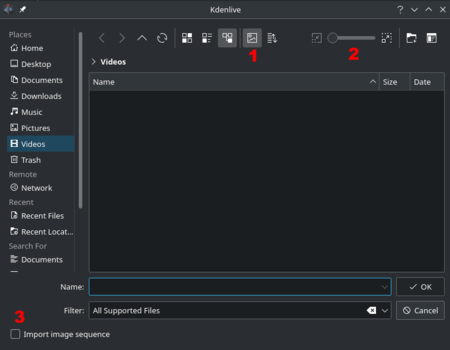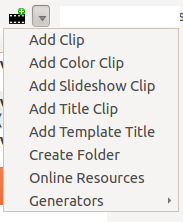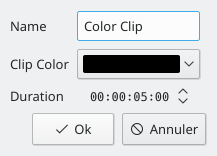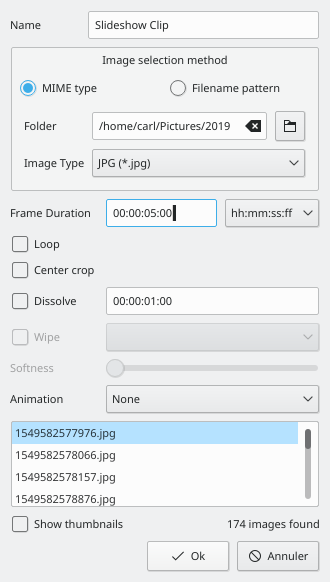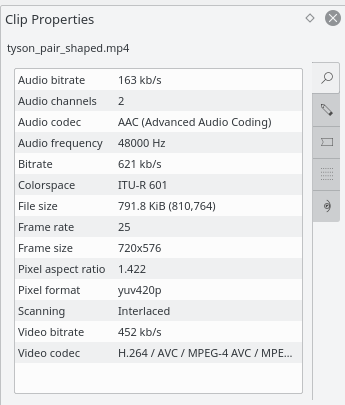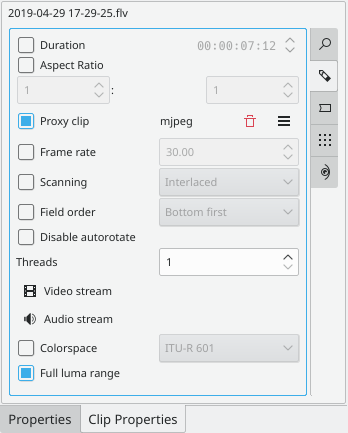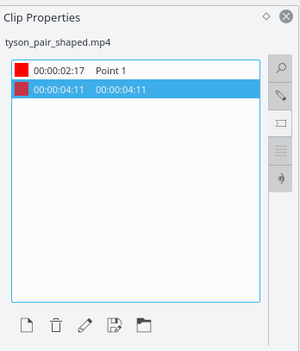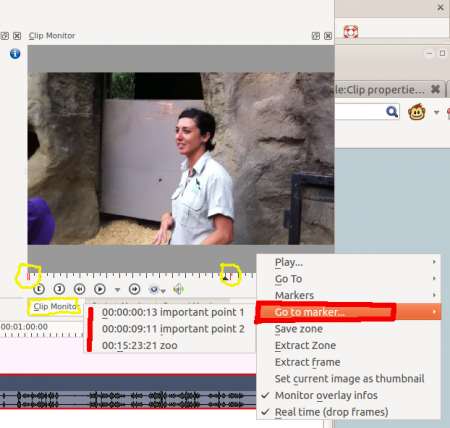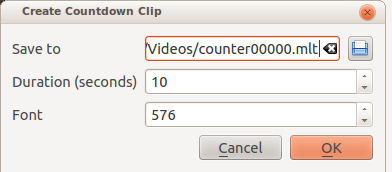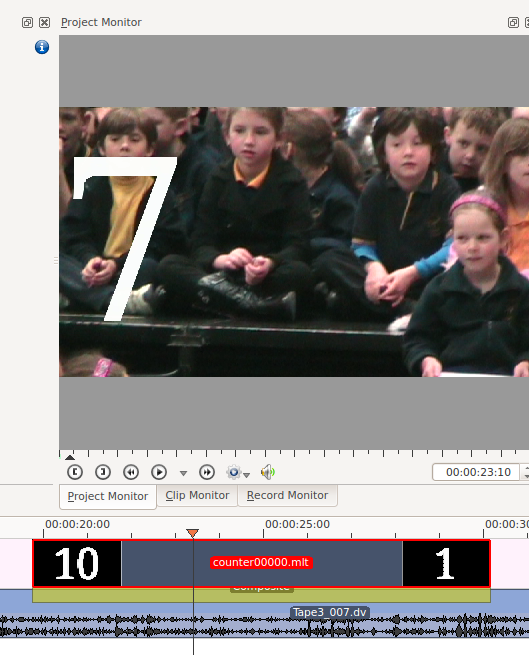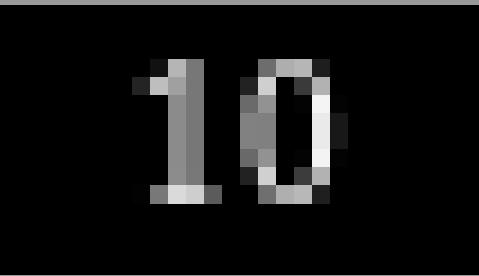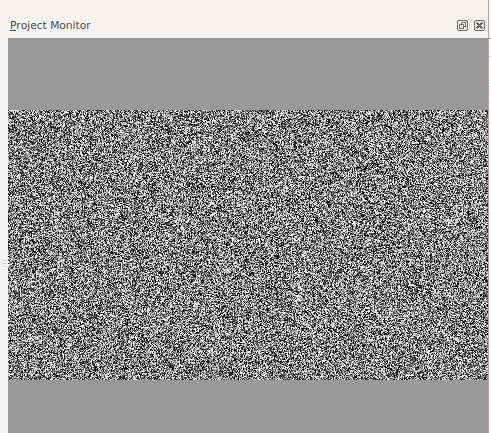Archive:Kdenlive/Manual/Projects and Files/Clips/zh-tw: Difference between revisions
Created page with "選擇一個合適的影格播放時間-這定義了每一張圖片出現的時間。" |
Created page with "設定完點擊<menuchoice>OK</menuchoice>. 影像檔由此目錄下的所有圖片構成,您選擇的第一張影格將加入專案樹。" |
||
| Line 47: | Line 47: | ||
選擇一個合適的影格播放時間-這定義了每一張圖片出現的時間。 | 選擇一個合適的影格播放時間-這定義了每一張圖片出現的時間。 | ||
設定完點擊<menuchoice>OK</menuchoice>. 影像檔由此目錄下的所有圖片構成,您選擇的第一張影格將加入專案樹。 | |||
You can then drag this video to the timeline. | You can then drag this video to the timeline. | ||
Revision as of 06:41, 10 April 2013
素材
素材 (影片, 音訊 和 圖片)
![]() 按下新增素材按鍵後開窗讓您可以選擇影片, 音訊 和 圖片,新增到 專案樹.
按下新增素材按鍵後開窗讓您可以選擇影片, 音訊 和 圖片,新增到 專案樹.
標示1 ![]() 的按鍵是切換檔案的預覽. 標示 2 的拉把是調整預覽檔案的大小. 標示3 的選取盒表示可匯入一系列圖片來生成動畫. 標示4的 選取盒表示圖片的背景是否要透明
的按鍵是切換檔案的預覽. 標示 2 的拉把是調整預覽檔案的大小. 標示3 的選取盒表示可匯入一系列圖片來生成動畫. 標示4的 選取盒表示圖片的背景是否要透明
你可加入多種型態的素材,下拉選單在 ![]() 按鍵的旁邊。
按鍵的旁邊。
色片素材
色片素材是單一顏色的圖檔可以加到專案樹裏。它們常用於充當字幕的背景。
選取 ![]() 按鍵旁邊的下拉選單裏面的來加入色片.
按鍵旁邊的下拉選單裏面的來加入色片.
開窗帶出 Color clip 的設定,你可以選顏色和區間。
點擊 把素材加到專案樹. 您可把它拖入時間軸。播放時間的長短可以在時間軸上調整。
字幕 素材
請參閱字幕
幻燈片素材
幻燈片素材由一系列圖片產生. 這種特性可用於製造由圖片產生的動畫或是投影片. 若是前者的話 - 可 用較短的影格時間,而後者的話可用較長的影格時間.
從 旁的下拉選單選擇來做投影片。
在 Slideshow clip 對話盒選擇 當做 Image selection method.
瀏覽圖片檔的存放路徑選擇第一張圖片將會生成你的投影片.後續的圖片檔會被選進來投影片,檔名最好有順序的命名方式,讓程式能預測下一張圖片是用那張。
例如:第一張圖是 100_1697.jpg ,第二張圖將是 100_1698.jpg, 等等。
選擇一個合適的影格播放時間-這定義了每一張圖片出現的時間。
設定完點擊. 影像檔由此目錄下的所有圖片構成,您選擇的第一張影格將加入專案樹。
You can then drag this video to the timeline.
Center crop: automatically fills the output video frame with the images while maintaining their aspect ratio by cropping equal amounts from a pair of edges. Said another way, it removes the black bars that will appear when the photo orientation or aspect does not match the video's.
Animation: adds preset slow smooth pan and zoom effects also known as the Ken Burns Effect. You can choose no animation, pans only, zooms only, or a combination of pans and zooms. Each option also has a low pass filter to reduce the noise in the images that may occur during this operation. Low pass filtering is much slower, so you should preview without it, and then enable it to render.
Create Folder
see Create Folder
Online Resources
see Project Menu - Online Resources
Stop Motion
Proxy clips
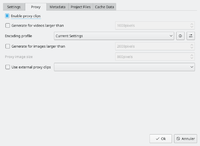
Proxy clips are one of the most useful inventions for editing if you are not working on a ultra high-end machine. The trick is that the original clips are replaced by clips with lower resolution clips, with a less complex codec. Video decoding, e.g. of H.264 clips, requires a lot of computing power, but computing power is required for rendering effects in real-time. If insufficient is available, replay will stutter. Proxy clips will require hardly any computing power at all, which allows fluent replay.
Proxy clips can be enabled / disabled for the current project in the Project Settings ().
To enable proxy clips by default for new projects, go to . See also Project Settings page
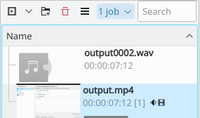
As soon as proxy clips are enabled, they can be generated for specific project clips in the Project Tree widget via the context menu . After you select for a clip a job will start to create a proxy clip. You can tell the progress of this job by looking at the little gray progress bar that appears at the bottom of the clip in the Project Tree - see picture. Clicking again disables the proxy for this clip.

Once the proxy clip creation has completed the proxy clip will appear with a P icon in the Project Tree.
When rendering to the output file, you can choose whether to use the proxy clips as well. It is by default disabled, but for a quick rendering preview it is useful.
Clip Properties
You can display and edit clip properties by selecting a clip in the project tree and choosing from the menu or from the right-click menu.
Video Properties
Advanced Properties
The tab displays... well ... the advanced properties of the clip. You can edit the advanced properties here. For example you can use Force aspect ratio to tell a clip that seems to have forgotten it was 16:9 ratio that it really is 16:9 ratio.
Advanced Clip property options are:
- Force aspect ratio
- Force frame rate
- Force progressive
- Force Field order
- Decoding threads
- Video index
- Audio index
- Force colorspace
- Full Luma range
Markers
You can use the tab to add markers for certain points in the source file that are important. However, it is probably easier to add markers to your clips via the clip monitor because using it allows you preview the file at the location where you are adding the marker.
Once markers are put in your clip you can access them in the clip monitor by right clicking and selecting (see picture.) Also note how the markers appear as red vertical lines in the clip monitor (see yellow highlighted regions in the picture.) You can turn on the display of the marker comments in the time line too - See Show Marker Comments
Markers can also be added to clips on the timeline. Right click the Clip and choose . Markers added this way also appear in the clip in the project tree.
Generators
Countdown
This generates a clip of a countdown timer that you can put into the timeline.
The font number in the dialog is a font size in pixels. However Kdenlive displays the font in a zoomed in fashion and thus lower numbers appear to be lower quality. See the pic below which is a font number 10 compared to the screen shot above which is font number 576.
It appears that you need a pan and zoom effect to make the font of the countdown smaller
Noise
This generates a video noise clip - like the "snow" on an out of tune analogue TV.

